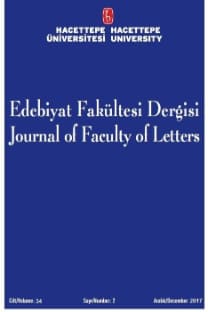Mastership and slavery
Mastership and slavery
___
- Arendt, H. (2003). İnsanhk durumu (B. S. §ener, Qev.). İstanbul: İleti§im Yayrnları.
- Arendt, H. (2004). Gegmigle gelecek arasında (B.S. §ener, Qev.).istanbul: İleti§im Yayrnları.
- Aristoteles. (1993). Politika. (M. Tun9ay, Qev.) İstanbul: Remzi Kitabevi.
- Aristotle. (l995).The complete works of Aristotle. Revised Oxford Translation, vol.1-2.J. Barnes (Ed). Princeton.NJ: Princeton University Press.
- Aristoteles. (1996). Metafzik (A. Arslan, Qev.). İstanbul: Sosyal Yayrnları.
- Aristoteles. (1998). Nikomakhos’a etik (S. Babiir, Qev.). Ankara: Ayra9 Yaymevi. Dobbs, D. (1994). Natural right and the problem of Aristotle’s defense of slavery. The Journal of Politics, Vol. 56, No.l ,pp.69-94.
- Finley, M.I. (1964). Between slavery and freedom. Comparative Studies in Society and History. Vol. 6, No.3 pp.145-164.
- Hare, R.M. (1979). What is wrong with slavery? Philosophy and Public Affairs, Vol.8, No.2,pp.103-121.
- Hegel,G.W.F. (1991). Tarihte akıl (Ö.S6zer,Qev.). İstanbul: Ara Yaymcılık. Kirkland, P. E. (2004). Nietzsche’s honest Masks: from truth to nobility ‘Beyond Good and Evil’. The Review of Politics, Vol. 66, No. 4,pp.575-604,
- Kranz, W. (1994). Antik felsefe (SY. Baydur, Çev.). İstanbul: Sosyal Yayrnları.
- Kuçuradi, I. (1996). Etik. Ankara: TFK Yayrnları.
- Kuçuradi, I. (1997). Nietzsche ve insan. Ankara: TFK Yayınları.
- Kuçuradi, I. (1998). insan ve değerleri. Ankara: TFK Yayınları.
- Love, N.S. (1987). Class or mass: Marx, Nietzsche, and liberal democracy. Studies in Soviet Thought, Vol.33, No. l,pp.43-64,
- Marx, K. (1986). 1844 Felsefe yazılan (M. Beige, Çev.). Ankara: V Yayınları
- Marx, K. (1998). Economic and philosophical manuscripts of 1844 and Communist manifesto (M. Milligan, Trans.). New York: Prometheus Books.
- Meirs, S. (2000). Contemporary forms of slavery. Canadian Journal of African Studies, Vol.34, No.3, pp.714-747.
- Nietzsche, F. (1968). The will to power (W.Kaufman, Trans.). London:Weidenfeld and Nicolson.
- Nietzsche, F (1985). Yunanhlann trajik çaginda felsefe (N. Hızrr, Çev.). İstanbul: BFS Yayınları.
- Nietzsche, F (1990). Ahlakın soykiitugu tisttine (A. İnam, Çev.). İstanbul: Yaymcılık. Ara
- Nietzsche, F (1997). Beyond good and evil (H. ZimmernTrans.). New York: Dover Publications.
- Nietzsche, F (2002). Güç istenci (S. Umran,Çev.). İstanbul: Birey Yaymcılık.
- Nietzsche, F (2003). İnsanca, pek insanca 1 (M.Tüzel,Çev.). İstanbul: İthaki Yayınları.
- Nietzsche, F (2004a). lyinin ve kötiinün ötesinde. (AJnam,Çev.). İstanbul: Say Yayınları.
- Nietzsche, F (2004b). İnsanca, pek insanca 2 Yayınları.(MTiizel, Çev.). İstanbul: İthaki
- Nietzsche, F (2004c). Zerdust böyle diyordu (O. Derinsu, Çev.). İstanbuhVarlık Yayınları.
- Nietzsche, F (2004d). Şen bilim (Ana Metin 1) (A.İnam,Çev.).istanbul: Say Yayınları.
- Nietzsche, F (2005). Putlann batisi (MTüzekQev.). İstanbul: İthaki Yayınları.
- Nietzsche, F (2007). Tan kızılligi (H.Salihoğlu, Ü.Özdağ,Çev.). Ankara: İmge Kitabevi.
- Özcan, M. (2006). İnsan felsefesiiinsanın neliği tistüne bir soruşturma. Ankara: Bilim ve Sanat Yayınları.
- Platon.(1988). Devlet. (S.Eyüpoğlu ve MA.Cimcoz,Çev.). İstanbul: Remzi Kitabevi.
- Platon. (1996). Gorgias (M.CAnday,Çev.). Diyaloglar 1 içinde, ss.44-134. İstanbul: Remzi Kitabevi.
- Simpson, P.L.P. (1997). A Philosophical commentary on the POLITICS on Aristotle. London: The Üniversity of North Carolina Press.
- Zeldin, T. (2003).İnsanhgin mahrem tarihi (E. Özsayar, Çev.). İstanbul: Ayrmtı Yayınları.
- ISSN: 1301-5737
- Yayın Aralığı: 2
- Başlangıç: 1983
- Yayıncı: Emine Erdoğan Özünlü
Artuklu-Eyyubi dönemlerinde Hasankeyf’te seramik atölyeleri ve üretimleri
17. Yüzyılda Osmanlı Uleması ve Hal Fetvaları
Geç Osmanlı Salattepe Populasyonu ve Cüzzam
Türkü Söylüyor Otlar: Toplumsal Irkçı ideolojiden bireysel psikolojik çöküntüye
Hayatın anlamı ve ölüm: Albert camus’den yaşam dersleri
Cengiz Aytmatov'un dişi kurdun rüyaları romanında doğal denge ve hayvan zihni
